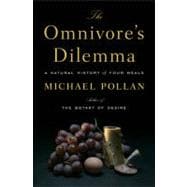
Note: Supplemental materials are not guaranteed with Rental or Used book purchases.
Purchase Benefits
What is included with this book?
| Introduction: Our National Eating Disorder | p. 1 |
| Industrial Corn | |
| The Plant: Corn's Conquest | p. 15 |
| The Farm | p. 32 |
| The Elevator | p. 57 |
| The Feedlot: Making Meat | p. 65 |
| The Processing Plant: Making Complex Foods | p. 85 |
| The Consumer: A Republic of Fat | p. 100 |
| The Meal: Fast Food | p. 109 |
| Pastoral Grass | |
| All Flesh Is Grass | p. 123 |
| Big Organic | p. 134 |
| Grass: Thirteen Ways of Looking at a Pasture | p. 185 |
| The Animals: Practicing Complexity | p. 208 |
| Slaughter: In a Glass Abattoir | p. 226 |
| The Market: "Greetings from the Non-Barcode People" | p. 239 |
| The Meal: Grass-Fed | p. 262 |
| Personal The Forest | |
| The Forager | p. 277 |
| The Omnivore's Dilemma | p. 287 |
| The Ethics of Eating Animals | p. 304 |
| Hunting: The Meat | p. 334 |
| Gathering: The Fungi | p. 364 |
| The Perfect Meal | p. 391 |
| Acknowledgments | p. 413 |
| Sources | p. 417 |
| Index | p. 437 |
| Table of Contents provided by Ingram. All Rights Reserved. |
The New copy of this book will include any supplemental materials advertised. Please check the title of the book to determine if it should include any access cards, study guides, lab manuals, CDs, etc.
The Used, Rental and eBook copies of this book are not guaranteed to include any supplemental materials. Typically, only the book itself is included. This is true even if the title states it includes any access cards, study guides, lab manuals, CDs, etc.